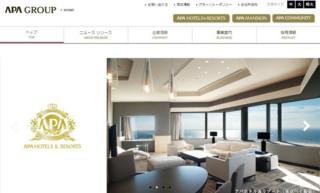 A Japanese hotel chain has come under fire for its owner’s claims that a World War Two massacre in the Chinese city of Nanjing did not take place.
A Japanese hotel chain has come under fire for its owner’s claims that a World War Two massacre in the Chinese city of Nanjing did not take place.
A book by Toshio Motoya, who owns APA Hotels, was found this week to be widely distributed in his outlets.
It has prompted a rebuke from the Chinese government as well as a boycott by Chinese hotel booking websites.
But the chain has refused to withdraw the book and Mr Motoya, an outspoken revisionist, has stood by his views.
The book is said to be available in every guest room and for sale in hotel gift shops.
What Japanese history lessons leave out
Japan’s growing voices of revisionism
The Nanjing massacre, also known as the Rape of Nanjing, is a hugely sensitive issue in China and a contentious subject in Japan.
In December 1937 Japanese troops invaded the eastern city of Nanjing. China says 300,000 of its civilians were massacred, but some historians have disputed this figure while some Japanese nationalists deny any killings took place.
The dispute is one reason why Beijing continues to accuse Tokyo of failing to properly apologise or atone for its wartime past.
In China, which introduced an annual state commemoration in 2014, the massacre has become a symbol of nationalism.
The book, titled « The Real History of Japan: Theoretical Modern History II », is a compilation of Mr Motoya’s columns written for the hotel’s newsletter.
Mr Motoya casts doubt on historical evidence of the massacre and claims it « was fabricated by the Chinese side and did not actually happen ».
In another section, he also denies that Japanese soldiers forced women to become their sex slaves.
The issue of « comfort women » is another sensitive subject in China as well as South Korea, where it currently is the subject of a row with Japan.
China’s foreign ministry has said Mr Motoya’s book « once again shows that some forces in Japan are still reluctant to look squarely at history, and even try to deny and distort history ».
APA, one of Japan’s largest hospitality chains with more than 400 hotels, is popular with Chinese tour groups.
But Chinese and Japanese media reports said that popular Chinese hotel booking portals such as Ctrip have pulled APA’s listings from their sites.
The chain said in a statement that it would not withdraw the book even though it had received « floods of opinions » and enquiries.
The book was a « fact-based true interpretation of modern history », it said.
« Although we acknowledge that historic interpretation and education vary among nations, please clearly understand that the book is not aimed to criticize any specific state or nation. »
Mr Motoya told Japanese newspaper Nikkei on Wednesday that he « wrote what I believe is the truth ».
The Japanese government has said both countries should look to the future « rather than paying excessive attention to our unfortunate history ».
It’s not clear how long the book has been available in APA hotels, but its existence was highlighted in a video posted on Chinese microblog site Weibo on Sunday by a couple who call themselves KatAndSid.
The couple, an American woman and a Chinese man studying in New York University, said they had noticed the book while staying travelling in Japan and staying in an APA hotel.
They added they wanted to raise awareness of the book so that guests, including Chinese nationals, would be better informed.
Their video has been shared more than 703,000 times.






